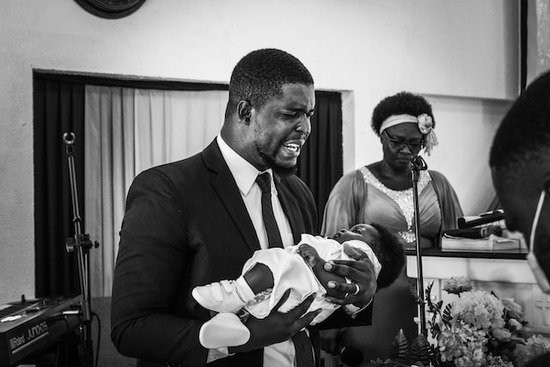For Christians, dedication ceremonies for babies are a special and memorable time for parents and the church. They often happen during a congregation’s main worship service when parents present their child before God and the church community, similar to how families did in the Bible. Both parents, along with the congregation, regard this as a solemn promise to be a Christ-like example to the child.
That’s why baby dedications are a significant step in the undertaking of Christian parenting. So let’s take a closer look at what Seventh-day Adventist baby dedications are like. We’ll learn:
- Where the practice of child dedication came from
- The purpose of child dedications—how it benefits church, parents, and child
- What happens at a baby dedication ceremony
- At what age children can be dedicated
Let’s begin by looking at the origins and history of faith-based baby dedications.
Where the practice of child dedication came from
Baby dedication is nothing new. We find references to it in the Bible as early as Exodus 13:1-2. Scripture also describes two specific and significant child dedications.
Examples in the Bible
We can read about the dedication of the prophet Samuel in 1 Samuel 1:27-28. Hannah, a woman who couldn’t have children, prayed earnestly to God to be able to have a child. God answered her prayer and she had a baby boy.
In thankfulness toward God for answering her prayer, she promised to “lend him [Samuel] to the Lord” (1 Samuel 1:28, NKJV). So when Samuel was old enough to be away from his mother, he served at the temple. And he grew up to be one of the most well-known prophets.
The other example is in the New Testament, and it involves none other than Jesus Himself. Luke 2:22-38 describes how Joseph and Mary took Jesus, when he was a few months old, to Jerusalem to “present Him to the Lord” (verse 22, NASB), which was done in honor of Exodus 13:1-2, 12 that talk about “consecrating” the firstborn to the Lord.
A local man named Simeon recognized Jesus was the Messiah, and, echoing the prophecies concerning Jesus, blessed Jesus and prayed over him.
It was quite beautiful. We’re told that Simeon “took Him in his arms, and blessed God and said,
‘Now, Lord, You are letting Your bondservant depart in peace, according to Your word;
For my eyes have seen Your salvation
Which You have prepared in the presence of all the people:
A light for revelation for the Gentiles,
And the glory of Your people Israel’” (NKJV).
Jesus went on to fulfill that prediction. He died on the Cross for all of our sins, making a way for each of us to have salvation.
Modern-day Baby Dedications
But a modern baby dedication we’re likely to see at many Protestant Christian churches has its roots in the 1500s with the Anabaptist Movement.1 In a nutshell, Anabaptists are Protestants who believe people should only be baptized by their own choice, when they make a conscious and intentional decision to accept Jesus. They felt that baptizing babies, who were too young to even understand this decision, did not acknowledge or consider the free will God created us with.
However, each child is a wonderful blessing from God, and that is a reason to celebrate! So instead of infant baptism, they upheld the biblical practice of child dedication.
And this is actually more of a focus on the commitment and responsibility of the parents, even though the child is being celebrated. The ceremony itself involves the parents, with the support of their faith community, making a pledge to God to raise their child with His guidance, and to introduce the child to Jesus.
This tradition stuck. Many Protestant denominations regularly hold child dedications as part of their church services or other church gatherings.
The same goes for Adventist churches. While there are many norms and traditions that go along with this ceremony, the Adventist Church Manual does not provide instructions that must be followed. It is up to the congregation, its leadership, and the family to determine what they would like to do for this memorable occasion.
Why babies are dedicated

Photo by Kelly Sikkema on Unsplash
Children have always held a special kind of importance to God. The Bible says that “children are a heritage from the Lord” (Psalm 127:3, NKJV). Jesus even told his disciples that the kingdom of heaven belongs to little children (Matthew 19:14). And since it was customary throughout the Bible to dedicate a child to God’s will and guidance, it shows that God wants to be lovingly involved in parenting these special little humans as well.
But as an easy way to sum up these sentiments, here are four primary reasons we dedicate babies in the Adventist Church:
- To express thanks to God for the miracle of birth. A new life is a precious thing. A child’s dedication recognizes God’s gift to a family and demonstrates deep gratitude toward Him.
- To ask God to bless and guide our children. Growing up is never easy. And while parents can provide a loving home, a Christ-like influence, and as many opportunities for growth as they can, no parents are perfect. What’s more, they won’t be the only influences in their child’s life, and they can’t make all their child’s decisions for them. This special dedication is a solemn prayer to God to guide and protect their child.
- To dedicate children to God’s will. “Dedicating” is another word for consecrating, which means to set something apart as distinct and special, often for a holy purpose. At a baby dedication, parents choose to place God at the center of their parenting. Rather than solely relying on the world’s knowledge and trends, they promise to make decisions with their child’s spiritual well-being in mind, and to model a live of service to others. The parents recognize that God’s will is perfect, and they vow to yield to His influence as they raise their precious young ones.
- To make a public commitment to raise children in a loving Christian home, and welcoming the congregation to show their support. Making a commitment in front of others who care about you just makes it all the more significant and meaningful, and it demonstrates how important this is to you—and to God. It’s a way to involve the whole church family in supporting and encouraging you in your parental journey.
It’s always a beautiful thing to see parents who deeply love their children and want to raise them in a caring faith community.
This ceremony is a way to acknowledge that importance while also encouraging a church family to maintain a strong, supportive bond, taking time to celebrate each new life. Parents also want their friends and relatives to share this special time with them, and you’ll often see grandparents, aunts and uncles, and friends standing up with them during the ceremony.
As members of the congregation sitting in the audience, we are reminded of our Christian obligation towards this young life being presented up front. We are responsible for our words and actions towards this child. Never should we say or do anything that would discourage them from forming a relationship with Jesus, and becoming the person He wants them to be.
So how exactly does a baby dedication go? Let’s take a look.
What typically happens at a baby dedication ceremony?

Photo by Anna Might on Unsplash
Firstly, while child dedications are cherished and spiritually-significant occasions, they are not required for Adventists. They do not affect a family or child’s standing within the denomination or the local congregation. They are meant to be the prerogative of each individual family, and there are countless ways that a child can be dedicated to God. There is no prescribed “formula” for how this ceremony should go.
But as for common child dedication practices among Adventist congregations, here’s what you are most likely to encounter.
It’s typical among Adventists to hold a dedication ceremony during the main church service, when most of the church family is present. But there are times when families might prefer a smaller, separate gathering, or to invite the pastor to their home for a private ceremony.
(Note: While some Protestant Christian denominations do hold infant baptism ceremonies, the Adventist Church does not equate a baby dedication with an infant baptism or christening. We are “credobaptists,” which means we believe a person should only be baptized once they are old enough to make a personal decision to follow Jesus.)2
When babies are dedicated, this is a demonstration of commitment by the parents and family of the child. It does not automatically make the child a baptized member of the church, though the family and congregation vow to do their best to encourage spiritual development and church involvement.
When it comes to the dedication ceremony itself, most are short and to the point. On average, about 5-15 minutes (since most babies and young children might have a hard time staying still while up front!). It’s also most common for these dedications to take place within a typical weekly Sabbath worship service. The family and the child’s name will likely be listed in the church bulletin.
At the appropriate time in the church service, the pastor invites the newly-expanded family to the front of the church with the pastor. Sometimes additional family or friends will join the parents up front, or they will stand by their seats in support.
If a family wishes to, some baby pictures might be shown on a screen during the ceremony, or someone might read a Bible verse that is meaningful to the family.
The pastor begins the dedication by asking the parents to affirm the biblical principles they will use in the raising of this child. These usually follow the theme of making an intentional effort to model themselves after Christ’s example, and to teach their child about their loving Creator.
Next, the pastor addresses the congregation, calling for them to commit to supporting this child and their family, pledging to help nurture their faith in Jesus as they grow.
After everyone has affirmed their commitment, the pastor prays over the child, both to bless them and dedicate them to God. The parents, siblings, and extended family are mentioned in prayer as well, asking God to provide them with courage and wisdom as they become teachers, influencers, and caregivers to this child.3
After the prayer, the pastor presents them with a small gift or commemorative certificate that symbolizes their commitment to bring up their child in a Christian environment.4
What age are babies dedicated?
The Adventist Church doesn’t have a required age, minimum or maximum, at which babies can or must be dedicated. It’s up to the parents when they feel ready.
Most Christian parents choose to dedicate their babies within the first year after they’re born, with an estimated average age of between 4 and 8 months old.5
However, this may not be the case for every family. Sometimes new members want to dedicate their children, even if they’re much older than babies. This is perfectly acceptable, too. It all depends on the situation and needs of the family. If a family wants to dedicate and consecrate their parenting efforts in a public manner that involves their church family, no one is going to refuse!
But if you still have questions about the best time or method for dedicating your children, you can always talk to your local pastor. Since there aren’t set “rules” when it comes to the age of the children or the type of ceremony it needs to be, a pastor will be more than willing to discuss how to orchestrate the most appropriate and meaningful dedication for your child.
After all, the whole point is for your family and the church to make a formal promise together, for the benefit of your children, in the presence of God. As long as that happens, the rest are just details.
No matter how they are done, baby dedications are a precious time for a family and a church.
They have the unique ability to bring together a faith community, parents, and relatives in a united effort to bring up a young child in an environment that introduces them to Jesus and His self-sacrificing love.
Learn more about Adventist families and households by visiting our page on
You can also learn more about making a decisive commitment to Jesus by reading
Find a Church
If you’re interested in finding a local Adventist church near you, you can use the Adventist Locator provided by the General Conference of Seventh-day Adventists.
Related Articles
- MacGregor, Kirk R., A Central European Synthesis of Radical and Magisterial Reform, p.144. [↵]
- “Credobaptist,” https://www.yourdictionary.com/credobaptist [↵]
- “Child Parent Dedication,” https://www.capitolhillsdachurch.org/contentpages.aspx?p=a3abd2d8-eaf4-4b99-8217-d0109dbe967b [↵]
- “Baby Dedication,” https://victoryny.adventistchurch.org/ministries/special-services/special-services—infant-dedication. [↵]
- “Child Parent Dedication,” https://www.capitolhillsdachurch.org/contentpages.aspx?p=a3abd2d8-eaf4-4b99-8217-d0109dbe967b. [↵]
More Answers
What is the Role of Laypeople vs. the Role of Clergy?
The word “laity” comes from the Greek word laikos, which means “of the people.”
Do Seventh-Day Adventists Have “Rules” For Clothing?
Many religions have guidelines on dress, but what about the Adventist Church? Discover how Adventists choose to dress based on biblical principles.
11 Reasons People Become Seventh-day Adventists
Curious why many people become Adventists? Here are elements of Adventist beliefs, values, and mission often reflected in people’s decisions to join.
What’s the Seventh-day Adventist General Conference Session?
At the General Conference Session, Adventist delegates from around the world gather to assess the state of the organization, pray, and discuss current issues. Here’s how it works.
How Adventists View the End of the World
The end of the world is no fun to think about. But here’s how we can actually find hope and comfort in what’s to come.
What Is an Adventist Medical Missionary?
A medical missionary in the Adventist Church is someone who cares for the medical needs of people as a way of showing the love of Jesus. They may travel to another country, or even just serve in their hometown.
Is the Seventh-day Adventist Church Protestant?
Learn how the beliefs of the Seventh-day Adventist Church align with the “5 solas” of Protestantism.
Are Seventh-day Adventists Evangelicals?
According to its origins and definition, evangelicalism is about following Jesus and the Bible and sharing the Gospel through the way we live our lives. Adventists wholeheartedly harmonize with these principles.
Could Anything Keep Me from Becoming an Adventist?
We are each saved through Christ. But when it comes to church membership, are there certain beliefs or expectations to become an Adventist?
Do Seventh-day Adventists Have “Rules”?
We uphold principles we believe will help us maintain a closer relationship with Jesus and His Word. Learn how these principles guide Adventist lifestyles.
Do Seventh-day Adventists Have “Rules” For Marriage?
Around the world, many cultures and religions have various marriage traditions, expectations, or even rules when it comes to choosing a partner, planning the wedding, extended family logistics, or a number of other things.
Can a Seventh-day Adventist Marry a Non-Adventist?
Yes. Seventh-day Adventists are not under any official rules that dictate who they can or cannot marry. This is a personal, life-altering decision between the couple and God.
What Adventists Believe About Alcohol and Tobacco Use
The Seventh-day Adventist Church has historically discouraged the use of alcohol and tobacco. Even before the church started in 1863, its leaders were realizing the negative effects of these substances.
Jewelry—Why Do Many Seventh-day Adventists Choose Not to Wear It?
If you walk into a Seventh-day Adventist church service, you might notice that many people aren’t wearing earrings, bracelets, necklaces, or sometimes even wedding rings.
International Pathfinder Camporee
Youth aged 10-15 in the Adventist Church’s global Pathfinder program look forward to the International Camporee every 5 years. This event brings together Pathfinders from around the world for exciting activities.
How Adventists interpret Bible prophecy
Bible prophecy conjures up a variety of emotions in people. For some, it feels exciting or mysterious.
Moviegoers’ Guide to The Hopeful: The Facts Behind the Film
Learn where and when you can watch The Hopeful and how to get tickets. Already seen it? We’ll uncover the real story that inspired this film.
How Are Seventh-day Adventists Different from Other Protestants?
As a Protestant Christian denomination, the Seventh-day Adventist Church regards the Bible as the ultimate guide and looks to Jesus Christ as the only way to salvation. We do have some differences of belief or interpretation when it comes to topics like Bible prophecy, end-time events, the Sabbath, and a person’s state after death.
How Adventists Handle Death and Funerals
Most Seventh-day Adventist funeral services are similar to those of other Protestant denominations, such as Methodists, Baptists, or Presbyterians, but you might find a few differences or unique nuances.
Adventist Culture
Many Seventh-day Adventists adhere to specific lifestyle principles that can make them stand out from those in other Christian denominations. Whether it’s going to church services on Saturday or eating the popular Adventist entrée of “haystacks.”
Do Adventists Observe Easter-Related Holidays?
Jesus Christ’s resurrection, celebrated on many Easter-related holidays, is central to the beliefs of the Seventh-day Adventist Church. And that means we seek every opportunity to remember it.
An Overview of Seventh-day Adventist Higher Education
The Seventh-day Adventist Church has about 118 tertiary schools around the world. Though many of them are within North America, you’ll also find Adventist universities in countries across the world—places like Croatia, Austria, Brazil, Madagascar, and the Philippines.
The Ten Commandments from a Seventh-day Adventist Perspective
Ever eaten a salad and gotten a big piece of green stuck in your teeth? And you didn’t realize it was there until you looked in the mirror? (Because no one ever told you!)
The Benefits of A Seventh-day Adventist Academy
Adventist academies are high schools (grades 9-12) that are owned and operated by the Seventh-day Adventist Church.
Are Seventh-day Adventists Christians?
Yes, the Seventh-day Adventist Church is a Protestant Christian denomination formed in 1863. Just like other Christians, we believe that Jesus Christ is our Savior and seek to follow the principles of the Word of God.
Adventist Movies: Where Faith and Film Meet
The Adventist Church uses film to share our faith and uplift positive values. Learn more about specific Adventist-produced films and where to find them.
Do Adventists Celebrate Christmas?
In general, most Seventh-day Adventists do celebrate Christmas.
Since our denomination doesn’t have specific guidelines about holidays, it’s up to each member to decide whether to celebrate it based on their personal convictions and study of the Bible.
What Does the Bible Say About Modesty
Seventh-day Adventists and Christians in general try to ensure their outward presentation and lifestyle glorify God. This often involves daily habits like the ways we hold conversations, the ways we dress and accessorize, and the ways we regard other people when we’re out and about.
How Do Adventists Make Movie and Music Choices?
How do Adventists decide what music to listen to and which movies to watch? Learn how Bible principles can help us make better entertainment choices.































